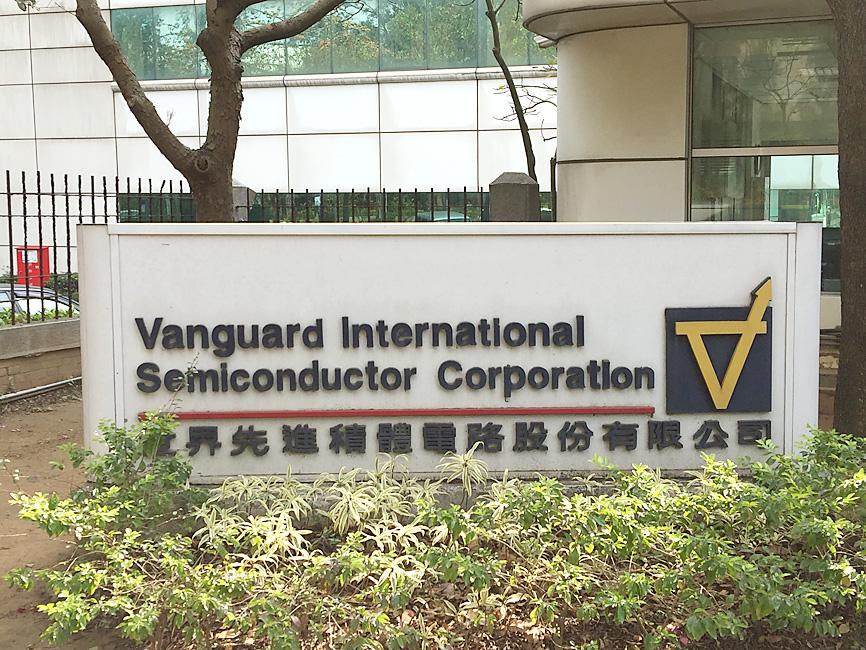Vanguard International Semiconductor Corp (世界先進), a supplier of display driver ICs and power management chips, yesterday said it expects revenue to slump as much as 16 percent sequentially and factory utilization to fall significantly this quarter, as customers, notably flat-panel makers, move to reduce inventory.
Revenue is expected to drop to between NT$12.9 billion and NT$13.3 billion (US$430.1 million and US$443.4 million) this quarter, compared with NT$15.3 billion last quarter, the Hsinchu-based chipmaker told an investors’ earnings conference.
As new orders are falling considerably, Vanguard forecast factory utilization to decline to about 83 percent this quarter.

Photo: Grace Hung, Taipei Times
The factory usage is likely to go down further next quarter, as it expects customers to take two to four quarters to get rid of excess inventory, it said.
To cope with short-term macroeconomic and industrial headwinds, Vanguard trimmed its capital spending for the year to NT$23 billion from an earlier estimate of NT$24 billion, with 70 percent of the budget allocated for the expansion of Fab 5, a newly acquired facility in Hsinchu from panel maker AUO Corp (友達).
“As the world economy is now slowing down for certain, demand in the consumer electronics market is shrinking, Vanguard chairman Fang Leuh (方略) said.
“Customers are adjusting inventory to align with [the downward trend]. We will discuss with customers our mid and near-term capacity buildup to fully match their demand and market conditions as much as possible,” Fang added.
The chipmaker also plans to slow capacity expansions for the Fab 5 by several months. Vanguard plans to ramp up the fab’s monthly capacity to 20,000 wafers by the end of next year, rather than in the first half as planned.
New capacity expansions at its Fab 3 in Singapore and Fab 5 are covered by long-term capacity supply agreements with customers, it said.
“Due to sluggish demand for consumer electronics, customers are aggressively adjusting inventory in the third quarter. Orders are being significantly reduced from the peak. Order visibility has narrowed to about three months,” Vanguard chief operating officer John Wei (尉濟時) told the conference.
Gross margin is forecast to slide to between 44 and 46 percent this quarter, compared with 50 percent last quarter, he said.
However, Vanguard expects average selling prices to remain stable in the second half of the year, as idled capacity due to reduced display driver IC demand would be used to produce better-priced power management chips, it said.
Vanguard yesterday reported record quarterly net profit of NT$4.89 billion for last quarter, soaring 87.8 percent from NT$2.6 billion in the same period last year.
Compared with NT$4.09 billion in the first quarter, net profit expanded 19.4 percent.
Earnings per share rose to NT$2.94 last quarter, from NT$1.58 in the second quarter last year and NT$2.47 in the previous quarter.

MULTIFACETED: A task force has analyzed possible scenarios and created responses to assist domestic industries in dealing with US tariffs, the economics minister said The Executive Yuan is tomorrow to announce countermeasures to US President Donald Trump’s planned reciprocal tariffs, although the details of the plan would not be made public until Monday next week, Minister of Economic Affairs J.W. Kuo (郭智輝) said yesterday. The Cabinet established an economic and trade task force in November last year to deal with US trade and tariff related issues, Kuo told reporters outside the legislature in Taipei. The task force has been analyzing and evaluating all kinds of scenarios to identify suitable responses and determine how best to assist domestic industries in managing the effects of Trump’s tariffs, he

TIGHT-LIPPED: UMC said it had no merger plans at the moment, after Nikkei Asia reported that the firm and GlobalFoundries were considering restarting merger talks United Microelectronics Corp (UMC, 聯電), the world’s No. 4 contract chipmaker, yesterday launched a new US$5 billion 12-inch chip factory in Singapore as part of its latest effort to diversify its manufacturing footprint amid growing geopolitical risks. The new factory, adjacent to UMC’s existing Singapore fab in the Pasir Res Wafer Fab Park, is scheduled to enter volume production next year, utilizing mature 22-nanometer and 28-nanometer process technologies, UMC said in a statement. The company plans to invest US$5 billion during the first phase of the new fab, which would have an installed capacity of 30,000 12-inch wafers per month, it said. The

Taiwan’s official purchasing managers’ index (PMI) last month rose 0.2 percentage points to 54.2, in a second consecutive month of expansion, thanks to front-loading demand intended to avoid potential US tariff hikes, the Chung-Hua Institution for Economic Research (CIER, 中華經濟研究院) said yesterday. While short-term demand appeared robust, uncertainties rose due to US President Donald Trump’s unpredictable trade policy, CIER president Lien Hsien-ming (連賢明) told a news conference in Taipei. Taiwan’s economy this year would be characterized by high-level fluctuations and the volatility would be wilder than most expect, Lien said Demand for electronics, particularly semiconductors, continues to benefit from US technology giants’ effort

‘SWASTICAR’: Tesla CEO Elon Musk’s close association with Donald Trump has prompted opponents to brand him a ‘Nazi’ and resulted in a dramatic drop in sales Demonstrators descended on Tesla Inc dealerships across the US, and in Europe and Canada on Saturday to protest company chief Elon Musk, who has amassed extraordinary power as a top adviser to US President Donald Trump. Waving signs with messages such as “Musk is stealing our money” and “Reclaim our country,” the protests largely took place peacefully following fiery episodes of vandalism on Tesla vehicles, dealerships and other facilities in recent weeks that US officials have denounced as terrorism. Hundreds rallied on Saturday outside the Tesla dealership in Manhattan. Some blasted Musk, the world’s richest man, while others demanded the shuttering of his